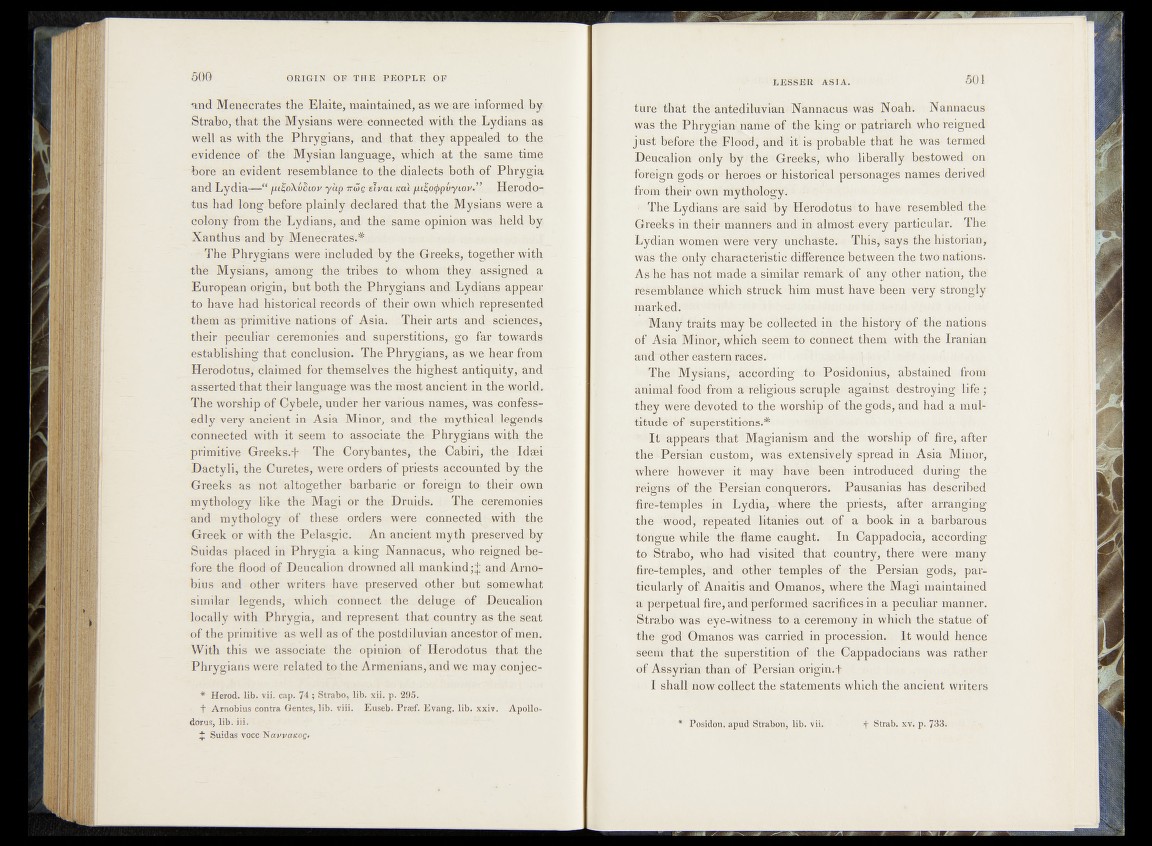
■and Meneerates the Elditc, maintained, agi wjiifip info7fl%d by
StrabOj that the Mysians were connected with, the Lydians as
welh as with the Phrygians, and: th a t. they • appealed to, the
evidence o£ the I Mysian language,, which at th e , same time
bore an evident resemblance to the dialects both of Phrygia
and L y d ia n “ p t i i o X v M o v y a p tc&q e l v a iiealpt^o {j> p v yiaM ^ l Hgsjodo“
tus.had long before plainly-declared that:the Mysi&E»S:w,&t*e a
colony from the Lydians, and the. same opinion was held, by
Xanthus and by MenecratcsV* ;
P The Phrygians were included the Greeks,, tegether wi th
the Mysians^ambng the tribes to whom they^asgtigned .a
Eu#®pean origin, but both the Phrygians and Lydians appear
.to have had historical records of their own which represented
them asqprimitive nations of Asia. Their arts and s&$iug!s,|
their peculiar cereroeiiaies^and superstitions,-vg®" far towards
establishing that.conclusion. The Phrygians, as;we. h&^pfrom
Herodotus, claimed for themselves the highest antiquity,: and
asserted'that their language was the most ancient in tbe-w;orlcL
The worship of Gybele, under her various? names^was-nonfesf-
edly very ancient in-Asia Minor, and the mythiealb:hg®ds
connected with it seem to associate the Phrygians witbljthe
primitive Greeks^- The Corybantes,* the rCabiri, the . Idaej
Dactyli,; the Curetes, were orders of priests accounted b y thp
Greeks ;as not'»altogether barbafie or foreign . to? t;kei&rO>W
mythology like the Magi or the Druids. . The. c.ervempnif§
and mythology of these orders were connected; with ,tb©!
Greek or with the Pelasgic. An ancient my th preserved by
Buidas placed in Phrygia a king Nannacus, who reigned before
the flood of Deucalion drowned all mankind ^ and Arno-
bius and other writers have preserved other „hut somewhat
similar legends, which connect the deluge of Deucalion
locally with Phrygia, and represent that country as the seat
of the primitive as well as of the postdiluvian ancestor of men.
With this we associate the opinion of Herodotus that the
Phrygians were; related tq.the Armenians, and we may conjee-
* Herod, lit», vii.' cap. 74; Strabo, lib. xii. p. 295.
+ Amobins contra Gentes, lib. viii. Euseb. Prasf. Evaiig. lib. xxiv. Apollo-
ddras, lib.rM^4
$ Suidas voce H a v v aK o g ,
fiïililthàt thé antediluvian Nannacus was Noah-. Nannacus
was the Phrygian* name of »the king or patriarch who reigned
ju st b'efore-th'e Flood; and it’is probable that he was termed
Deucalion ' ö t i f f by thë ^Greeks, who jj liberally bestowed on
ferëlgn ^od's'or' herbes or historical personagesmames derived
from their own 'mythology-. I
The Lydians1' are said by Herodotus toh a v e resembled the
Greeks in tbei:F&mannèrs andb&i abnosfcevery- particular.. The
Lydian women were very" ünch^teö This,- Says the historian,
vVasftheió<rifyfG>haraGtèristic difference between the two nations.
Asdte.hasnot made'ajêmiilâf «remark of any. other nation, the
pêâfemblàne'è ;whibh struck him must have been ; very strongly
markedr»**
Many traits may be collected in the History of the nations
of Asia4 Minor,‘Whiehfseëhij to connect them with the Iranian,
and^nthdr et®tern,raco*s.
The Mysihns^. according .to« Posidonius, abstained' .from
a dm alfcfeè fîèim £a -religiousscruple. against destroying life ;
t hèy f#ëtodëvötëd to the worship of the gods ,îand had a multitude
©Superstitions.*
• I i appears that -Magiamsm and the .worship of1 fire'pUfter
theiP^siafe* custom,5 was extensively spread in Asia:Minor,
wheï’è- bowevér -itr mS-JH-havei beem introduced' during* the
^ügifsJ' Juf tëhfe -Persian-ïcönq>ne'rdrsi' PausaUias has?, d^cribed
fire-tëfâ^dëNin Lydia,-where the priests, after arranging
the- -wood-; ‘fbpeated litanies- ouUof> a bóok in a barbarous
têrïgtfe while the flame feaught. In Cappadocia, according
tb1 Strabo, who had visited that country', there iwere< many
ÉtÖitempleS;^and other'temples o f t h e Persian, gods,- particularly
oft Ànaitis and O manos, where the Magi; maintained
a perpetual fire, and performed sacrifices in a« peculiar manner.
Strabo was ey'é-witness' toaceremony in which the statue of
the gód' Omanos was carried in processions I t woûld hence
seem that the superstition ofo the^Cappadocians was rather
e i Assyrian than of Persian origKKffc,!?
I shall now cdllèSt the statements which the ancient writers
Posidon. apud Strabonj lib. vii. Strab. xv. p. 733.